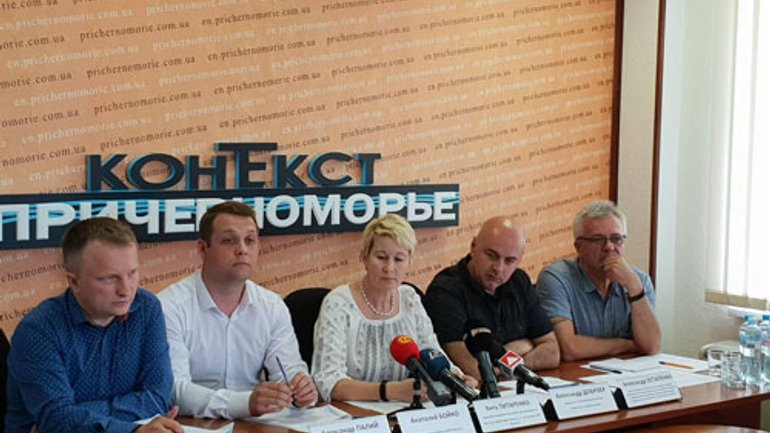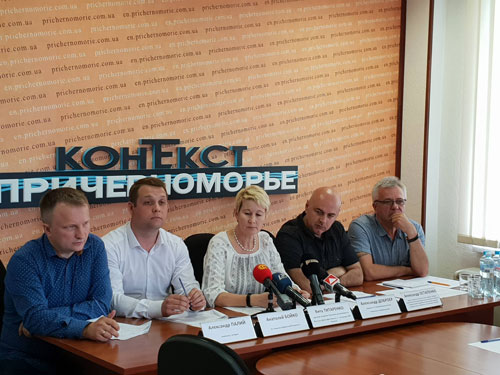Residents of southern Ukraine not knowledgeable enough about establishing the local Ukrainian Orthodox Church - social survey

In Odessa, on July 3, 2018, a press conference themed “Odessa: Religion and Politics” was held, where the results of sociological surveys among the Odessites, held under the auspices of the European Institute of Social Communications by a consortium of independent sociologists were presented. Religious scholar Vita Titarenko has given her account of it.

The following issues were discussed: the attitude of Odessites to the role of religion in Ukrainian society, significance of establishing the Ukrainian Autocephalous Local Orthodox Church, the opinion of Odessites regarding the events in Ukraine, political aspects of decentralization, etc.
Odessa is a special, or even specific region – it is a multinational (with a numerical dominance of the ethnic group of Ukrainians - 66.8%, in the second place come the Russians, 22.4%, the rest are within a sociological error) and multiconfessional region (with the domination of the Orthodox component, where 20, 8% are adherents of to the UOC-KP, and 19.7 of the UOC-MP (MP)).
In 2010, in Odessa, sociological surveys were conducted by Gorshenin Kyiv Institute of Problems and Management. At that time, 15.5% adhered to UOC-KP and 22.8% to the UOC-MP, while a fairly high percentage was constituted by the respondents who believed in God, but did not associate themselves with any religious organization – 39.2%. Such distancing from religion can be explained by the circumstances of 2010. Then the head of state became Victor Yanukovych, who tried in every way to establish relations with Russia and expressed ambiguous support of the UOC-MP (MP).
It is possible that these conditions became the reason for the demonstration by the Odessites of their non-religiosity and non-confessionality, since 25.3% identified themselves as Orthodox / Christians, but did not consider themselves as adhering to any faith.
The indistinct religious identity is illustrated by the fact that 33.3% of respondents believe in God, but do not regard themselves as belonging to any religious community, and 12.3% consider themselves atheists. The number of atheists increased in comparison with 2010, when 9.8%. considered themselves atheists. It can be assumed that the number of atheists and, probably, the number of supporters of the UOC-KP augmented at the expense of those who considered themselves simply a Christian. Such an assumption can be justified by the fact that at the backdrop of the sufficiently high declared religiosity of Ukrainians – 72%, the religiosity of the South is the lowest (58.5%), giving way to the East, the Center, and especially the West, where this indicator is the highest. That is, the amplitude of the respondents' views may be broad.
However, as is known from statistics, the number of UOC-KP parishes in Odesa has increased from three to six, which in general confirms the tendency of increase of the followers of the UOC-KP in all regions of Ukraine. However, the idea of territoriality was supported here by only 13.6% of respondents (17.3% did not support and 48.8% showed indifference).
The foundation Ilko Kucheriv Democratic Initiatives, differentiating the answers to this question by regional division, notes that support is expressed by 9.5%, 24.4% do not support, and 48.8% are indifferent. From these indicators, it follows that Odesa expresses somewhat higher support than the overall figure of the South, while other indicators, as we see, are almost identical. But it is interesting that 9.1% believe in the possibility of constituting the Ukrainian Autocephalous Church based on the UOC (MP), while the issue of the constitution of the Ukrainian Orthodox Church on the basis of the UOC-KP was not raised at all.
The situation is influenced by several factors:
First, as already mentioned, the lowest level of religiosity in this region. Secondly, the South of Ukraine has the highest rate, where the conflicts between the Churches are regarded as purely political - 39.8% (the average for Ukraine is 31%). Attitudes towards politics are marked by indicators of attitudes towards the institutions that form and implement this policy – the Verkhovna Rada of Ukraine and the President of Ukraine. The index of attitude towards them in the represented studies is the lowest.
Volunteers' organizations, civic organizations and the church occupy the first places because their activities are visible at the local level. Consequently, the link between the constitution of the Ukrainian Autocephalous Local Orthodox Church and politics diminishes its significance, demonstrating alongside, conditional non-religiosity and a certain indifference towards politics, and distancing therefrom. In addition, a certain marginalization of the region, as a consequence, focuses on the solution of local issues (and the confidence of these possibilities, without interference from above), being less concerned with the national scale in solving public tasks, including the establishment of the Ukrainian Autocephalous Local Orthodox Church.
Sociological surveys testify to the ambiguity and unevenness in assessing the significance of the Ukrainian Orthodox Church's acquisition of its autocephalous (local church) status – it is a cut of a certain social sentiment at the moment, and, therefore, it is subjected to influence, due to the activity (or passivity) of the subjects of the situation.
The region manifests an insufficient level of public awareness of the efforts of the President in the matter of constituting the Ukrainian Autocephalous Local Orthodox Church – what is the benefit of it? Why is this being done? What changes can this have for the region? There is also an inadequate awareness of the very concept of the Ukrainian Autocephalous Local Orthodox Church. What is autocephaly? Amount? What can change with the approval of the Ukrainian Autocephalous Orthodox Local Church – in the Church itself, in society, in Ukraine, etc.
Such survey results show not just how certain tendencies, such as necessity, using the media, educational opportunities, etc., to form a practical request of society for autocephaly, both as a religious part thereof (society) and its non-religious, as in the current situation in the country, which can be described as a situation in the state of the exacerbation, this question not only goes beyond the church sphere, but it is no less important than the visa-free regime, the Association Agreement with the EU or the efforts aimed at association with the EU, the NATO membership and so on.
The high degree of fragmentation of the political and religious sectors, the religious and security sectors brings the issue of autocephaly to the much wider horizons – it acquires the meaningful and existential value for today and for the near future.









